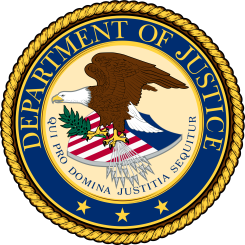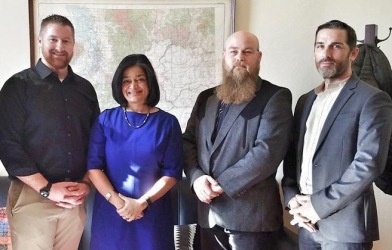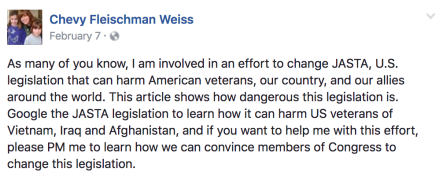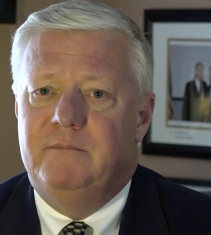DOJ Fails to Pursue Allegations of Saudi Lobbying Misconduct
U.S. military veterans say Qorvis Communications tricked them into unknowingly lobbying on behalf of Saudi Arabia
Campaign against law enabling 9/11 victims to sue kingdom used unregistered agents, failed to provide required disclosures
By Brian P. McGlinchey
 In March 2017, a group of 9/11 families presented the Department of Justice with 17 pages of detailed allegations that Qorvis Communications had, on behalf of Saudi Arabia, conducted a lobbying campaign against the Justice Against Sponsors of Terrorism Act (JASTA) characterized by extensive violations of the Foreign Agents Registration Act (FARA).
In March 2017, a group of 9/11 families presented the Department of Justice with 17 pages of detailed allegations that Qorvis Communications had, on behalf of Saudi Arabia, conducted a lobbying campaign against the Justice Against Sponsors of Terrorism Act (JASTA) characterized by extensive violations of the Foreign Agents Registration Act (FARA).
In the worst instance, veterans who were flown to Washington to lobby against the measure say Qorvis withheld the fact that it was bringing them to Capitol Hill to advance the Saudi agenda, and that the kingdom was paying for their airfare, lodging and meals.
Eighteen months after 9/11 families filed their formal complaint, there’s no indication any investigation ever took place. “It’s one of the most deceptive campaigns that any foreign lobbying operation has ever done, and yet there’s been no punishment whatsoever,” says Ben Freeman, director of the Foreign Influence Transparency Initiative.
Justice Department national security spokesman Marc Raimondi declined to comment.
Meanwhile, a recent revelation by a retired FBI counterintelligence agent offers yet another indication of a systemic DOJ tendency to put protection of the kingdom’s reputation ahead of the pursuit of justice.
Veterans Tricked into Lobbying for the Kingdom
In September 2016, Congress enacted JASTA by overriding President Obama’s veto. Saudi Arabia then unleashed a massive campaign aimed at amending the law, which cleared the way for 9/11 victims to sue the kingdom for financial and logistical support allegedly provided by government officials.
That campaign tapped many firms in Saudi Arabia’s formidable influence arsenal, but the claims of misconduct focus on the kingdom’s flagship lobbying and public relations firm: Qorvis Communications, a subsidiary of MSLGROUP.
Facing Americans’ deep sympathy for 9/11 families, Saudi Arabia and Qorvis sought a sympathetic face of their own for their campaign to weaken JASTA, and found it in U.S. military veterans.
Saudi Arabia, Qorvis and the kingdom’s allies in U.S. government–most notably, senators John McCain and Lindsey Graham—pushed a coordinated campaign built on the claim that, if JASTA were allowed to stand, U.S. service members and veterans going back as far as the Vietnam War would be exposed to lawsuits abroad.
That’s false, according to William S. Dodge, former counselor on international law at the State Department. “JASTA poses no risk of exposing U.S. service members to lawsuits in foreign courts. JASTA deals only with the immunity of foreign states, not individuals,” Dodge told 28Pages.org last year.
Though empty, the claim proved all too effective in creating alarm among well-intentioned veterans recruited via a grassroots campaign carried out by scores of political consultants across the country.
 Many were persuaded to sign group letters to Congress or send individual messages of their own. Some agreed to put their names on op-ed pieces printed in newspapers around the country that used identical language.
Many were persuaded to sign group letters to Congress or send individual messages of their own. Some agreed to put their names on op-ed pieces printed in newspapers around the country that used identical language.
Qorvis appears to have used a bounty system, with the highest reward given for persuading veterans to travel to Washington. In an email pitch to veterans, Saudi agent Shelbi Lewark wrote, “You don’t have to know anything about JASTA…They will be putting you in the Trump hotel, which is incredibly nice…It’s an awesome trip and basically like a 5 star vacation.”
Offered the chance for a free trip to the nation’s capital to work alongside fellow veterans for a cause they believed to be noble, upwards of two hundred or more leapt at the opportunity over a period of months.
Many were in for a terrible surprise, telling 28Pages.org they didn’t find out the kingdom was pulling the strings until they’d already started making the rounds on Capitol Hill. Several say organizers didn’t merely conceal Saudi Arabia’s role, but actively denied it.
Victimized Veterans Ask: Where’s the Investigation?
In a series of articles published here last year, veterans expressed outrage over the fraud perpetrated upon them by Qorvis and its hired hands.
Now, well over a year after they spoke out about the Saudi-Qorvis scam, three of the veterans lured into the Saudi web want to know why the Justice Department hasn’t contacted them or taken any other discernible action.

“The government not in some way looking into this just raises all kinds of red flags as to where their loyalties are,” says T.J. Hermesman, a Marine veteran who deployed to Afghanistan.
“One part of me feels like it’s fucking crazy. The other part of me says it’s business as usual,” says David Casler, a former Marine who deployed to Iraq. “Our geopolitical relationship with the kingdom of Saudi Arabia is such that they can pretty much get away with anything and everything.”
Hermesman says the DOJ is sending the wrong message to Saudi Arabia and other foreign governments. “If there’s no response whatsoever, it’s going to show the door’s wide open,” he says.
Noting that former Trump campaign manager Paul Manafort was charged under FARA in the Mueller probe while the sprawling Saudi lobbying scandal has gone completely uninvestigated, lawyer and retired Army officer Lorraine Barlett says selective prosecution “politicizes the legal system, undermines the rule of law nationwide and promotes disobedience.”

“
Qorvis Condemned
The veterans remain indignant over their treatment at the hands of Qorvis, which is on a $279,500 monthly Saudi retainer and received $6.2 million from the kingdom during the six-month period that encompassed most of the veterans lobbying program.
“Where do they come from to think that’s an OK idea to use veterans like that?” asks Hermesman.
While Saudi Arabia has a well-established reputation for ruthlessness, the veterans find Qorvis’s conduct all the more galling considering most or all of the firm’s executives and employees are their fellow Americans.

If he met the architects of the Qorvis scam, Hermesman says he’d ask, “How does it feel to completely lose your loyalty and not only go against your own country but go so far as to use young war veterans? It’s a pretty crazy level of disrespect and disloyalty.”
“It’s absolutely reprehensible,” says Barlett, who was brought to Washington by Qorvis-affiliated Capitol Media Group. “It’s unbelievable that they would stoop that low. They obviously have no shame and they’re willing to push the envelope as far as they can push it. They have no moral compunction about exploiting a group of citizens who would otherwise be deemed worthy of respect.”
Campaign Used Unregistered Agents
If the DOJ were to investigate the Qorvis campaign, they would likely find the firm ran roughshod over a variety of FARA requirements.
For starters, those working on behalf of a foreign government are required to register with the DOJ as agents of that government; many involved in the sprawling campaign against JASTA did not. Failure to register can trigger fines of up to $10,000 and prison terms of up to five years.

To take one apparent example of an unregistered agent on the Qorvis campaign, consider political consultant Elliott Schwartz. A partner at QE Intelligence, Schwartz previously ran the war room for Jeb Bush’s presidential campaign and was director of research for the anti-Trump Our Principles PAC.
According to Army veteran Barlett, Schwartz made travel arrangements, emailed an itinerary of activities, met veterans at their hotel and accompanied them to Capitol Hill. However, he does not appear in a search of the DOJ database of foreign agents.
Similarly, veterans have identified three individuals—Daniel Tinsley, Dustin Tinsley and Cole Azare—who helped organize and lead a veterans lobbying operation led by registered agent Jason Johns. None of the three registered with the Justice Department.
FARA’s registration requirement applies regardless of whether one’s efforts are compensated. Thus, had the campaign been operated with required transparency, it would seem that each of the hundreds of volunteer veterans should have registered too. Of course, had Qorvis told them they’d have to register as an agent of Saudi Arabia, the program’s true objectives would have been revealed and most wouldn’t have signed on in the first place.
The Justice Department also seems to have tolerated non-compliance that should be readily apparent to its staff: Capitol Media Group has failed to file the twice-yearly supplemental reports required under its status as a “primary registrant,” and the firm’s owner, Scott Wheeler, himself appears to have never registered as an individual agent despite having disclosed his role in the veterans lobbying scheme in his firm’s filing.
Recruiting Materials Lacked Required Disclosures
FARA requires that written materials used to advance the agenda of a foreign government include a conspicuous disclosure that the material is being distributed for that government.

Not only was the disclosure lacking on some materials—it appears to have been removed from a flyer used to persuade veterans that JASTA posed a risk to service members.
Qorvis filed the flyer with the Justice Department on October 26, 2016. Titled “The Real Impact of JASTA,” it included the required disclosure.
A nearly-identical version was later used to recruit veterans to the cause—on social media, as a printed handout and as a PDF attached to emails.

The only difference: The FARA-required disclosure had gone missing.
Upon their arrival in Washington, veterans who lobbied in the Jason Johns operation received a detailed, six-page set of instructions and guidance modeled after a military operations order. It disclosed that Qorvis and Advocacy Group, Inc were supporting the undertaking, but did not disclose that the two organizations and Jason Johns were working for Saudi Arabia.
 Some Saudi agents, such as former Maryland GOP communications director Chevy Weiss, used Facebook as a recruiting tool, but failed to disclose their Saudi sponsorship on their posts or their profiles—another FARA violation.
Some Saudi agents, such as former Maryland GOP communications director Chevy Weiss, used Facebook as a recruiting tool, but failed to disclose their Saudi sponsorship on their posts or their profiles—another FARA violation.
A federal investigation may uncover still more. For example, were the veterans listed on three group letters to Congress (pages 6, 12 and 19 here) urging that JASTA be amended told that their names were being solicited on behalf of Saudi Arabia?
Some Qorvis Victims Likely Remain in the Dark
Importantly, an investigation would also be a means of enlightening participating veterans who still haven’t found out the real reason they were flown to Washington to oppose JASTA.
When Capitol Media Group filed its months-late registration, it declared that it had brought scores of veterans to Washington to lobby and offered to provide “individual names if requested.”
28Pages.org made repeated requests to the Justice Department’s FARA section requesting it to direct Capitol Media Group to produce the names via a supplementary disclosure filing. Though an aide to Senate majority whip and judiciary committee member John Cornyn also followed up on the request, no names have been disclosed by Capitol Media Group or Qorvis.
FBI Tells Retired Agent Not to Aid 9/11 Case: Saudi Relations Come First
Inattention to the Saudi-Qorvis scandal isn’t the only indication that the Justice Department puts the interests of Saudi Arabia above those of American citizens.

As 28Pages.org was first to report in August, retired FBI counterintelligence agent Kenneth Williams said the FBI’s Office of the General Counsel told him not to cooperate with 9/11 victims’ attorneys pursuing the civil suit against Saudi Arabia enabled by JASTA.
According to Williams, an FBI attorney “said they didn’t want me to cooperate with the plaintiffs’ attorneys because it could impact other pending litigation involving the United States government…and because…the Trump administration was trying to develop good relations with the Saudi government.”
It’s not clear what “other pending litigation” the FBI attorney was referring to; Williams considers the possibility it may have been a bluff. If not, it seems a likely reference to Freedom of Information Act suits filed by investigative news outlet Florida Bulldog, seeking documents relating to FBI investigations of Saudi links to the 9/11 attacks.
After several guilt-ridden months of complying with the FBI’s directive, Williams decided to follow his conscience and began communicating with the attorneys. Former Senate intelligence committee chair Bob Graham called the FBI’s attempted intervention “a fundamental assault on the principle of democracy.”
Enabling Bad Saudi Behavior
Reflecting on the Justice Department’s action with Ken Williams and inaction regarding Qorvis, the Foreign Influence Transparency Initiative’s Freeman says, “It’s part of this larger pattern of enabling Saudi bad behavior, whether it’s from the government of Saudi Arabia or its lobbyists here. They continue to do things that are harmful to Americans and not get punished for it and, ultimately, we see a Saudi Arabia that feels emboldened enough to kill a Washington Post journalist on foreign soil.”
For Saudi-victimized veteran and attorney Barlett, the Justice Department’s conduct is cause for alarm among all Americans: “If you don’t enforce the law, you destroy the rule of law writ large. The DOJ is supposed to be the top federal agency for law enforcement, supporting the rule of law and the Constitution. When a body like that is corrupted, the fish rots from the head down, and therefore it’s going to impact the entire legal system.”
https://28pages.org/2018/10/24/doj-fails-to-pursue-allegations-of-saudi-lobbying-misconduct/

0 Comments:
Post a Comment
Subscribe to Post Comments [Atom]
<< Home